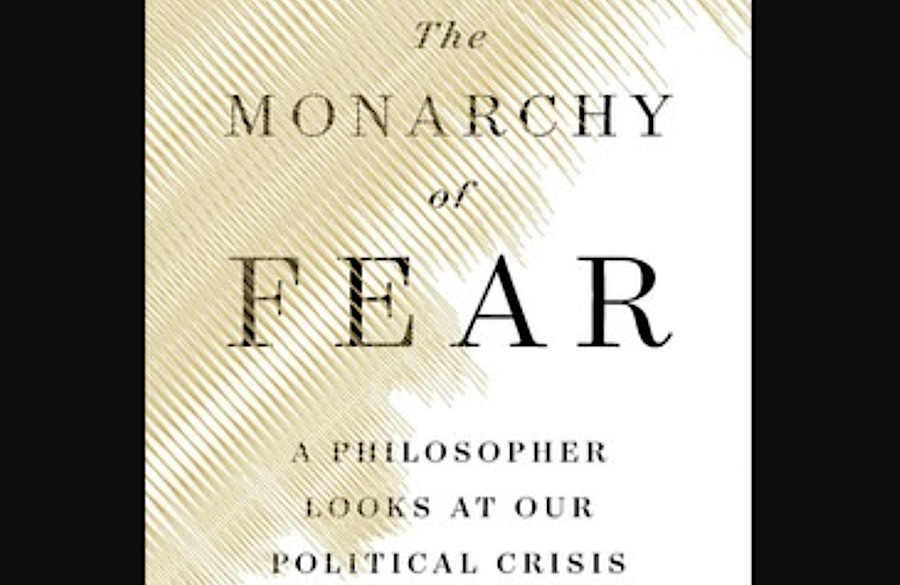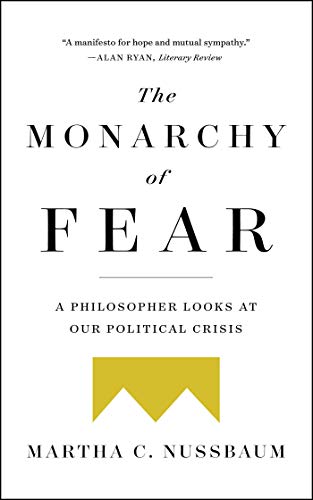Fear and Our Political World
Philosopher Martha Nussbaum writes, "Monarchs feed on fear from below. Fear of the monarch's punishment ensures compliance. And fear of outside threats ensures voluntary servitude." Simon & Schuster
Simon & Schuster
“The Monarchy of Fear: A Philosopher Looks at Our Political Crisis”
A book by Martha C. Nussbaum
Given its title, you might think Martha C. Nussbaum’s latest book, “The Monarchy of Fear: A Philosopher Looks at Our Political Crisis,” delves into America’s deepening political morass.
Well, think again. The renowned and prolific author prefers to mine ancient Greece and Rome for situations or dilemmas that are in her mind analogous to those the U.S. grapples with today. “As I’ve found in teaching,” explains Nussbaum (professor of law and ethics at the University of Chicago, and recipient of the 2016 Kyoto Prize in Arts and Philosophy), “we often think better, and relate to one another better, when we take a step back from the daily, where our immediate fears and wishes are likely to be at stake.”
Perhaps, but this will do little to mitigate the frustration felt by a reader expecting—reasonably enough—a hands-on examination and forthright assessment of America’s rancorous domestic discord. Because of her largely circuitous approach to the here and now, Nussbaum often comes across as rather coy. Meanwhile, her perceptive take on fear’s role in powering sociopolitical iterations of anger, envy and even disgust lacks a complementary consideration of what concerned parties might do to allay the not unfounded fear on the part of a segment of white American society that its economic and political clout is being eroded.
It remains noteworthy, however, that although President Trump, chief architect of America’s extraordinarily fraught contemporary political scene, rarely comes in for a drubbing, he nonetheless looms large throughout this book as a not-so-august monarch of fear. (In an imagined dialogue with a “defender of fear,” Nussbaum opines that “monarchs feed on fear from below. Fear of the monarch’s punishment ensures compliance. And fear of outside threats ensures voluntary servitude: fearful people want protection and care.”) Also, to her credit, the author takes to task those of Trump’s detractors who issued dire pronouncements upon his election as president for “reacting as if the end of the world is at hand.”
Click here to read long excerpts from “The Monarchy of Fear” at Google Books.
To be sure, Nussbaum concedes that fear isn’t always irrational; there are phenomena of which it is logical to be afraid. And she even allows that in such instances, fear, especially when “filtered by careful and extended public deliberation,” can have a positive effect. It might spur us to take wise security precautions, enact much-needed legislation to protect the vulnerable, or engage in the kind of study and experimentation that results in scientific and other findings that benefit our planet.
Yet there is another fear: loss of privilege. This particular fear, whether grounded in reality or not, too often escalates into paranoia that one’s group (men, say, or white Americans) faces an organized campaign aimed at its displacement or even elimination. If you have fallen victim to such a delusion, you’re usually just one step away from “othering” or even scapegoating entire communities of your compatriots. And that’s just the beginning. The author makes the convincing case that fear, especially the paranoid kind in question, is protean; as such, it can and does assume the form of retributive anger, envy and even disgust (unwilling to come to terms with our own “animality,” we project it onto this or that racial/ethnic/religious group, with some men doing the same vis-à-vis women).
Nussbaum grasps the paradox that letting go of all fear by taking our cue from the Stoics and fostering a spirit of indifference would entail surrendering our capacity to feel love. So we’re left with the imperative of resisting the encroachment of fear’s specifically irrational variant.
How might we do that?
The author offers several pointers, arguably chief among them: Take care not to allow the immediacy or salience of certain phenomena (such as crimes or terrorism committed by members of an identifiable community) to obscure the crucial matter of proportional likelihood; keep in mind Aristotle’s observation on the fear-mongering formula a shrewd politician will follow, which kicks off with an attempt to convince the populace of a clear and present danger to the nation; guard against falling into an echo chamber, despite the obvious “comfort of an insulating peer group who repeat one another’s falsehoods”; and cultivate that openness to others that characterizes democracy and contrasts with the self-obsession and even narcissism of the “monarchical” mindset this book warns against.
Pretty solid advice all around. The problem? Nussbaum has precious little to say to people who are already fearful—and have reason to be. The most relevant example is those who find themselves obliged to cede ground to previously marginalized groups. As the author observes in the course of her discussion of the American version of what the late Moroccan feminist Fatema Mernissi described (approvingly) as women in the Muslim world “invading the public space,” this has inevitably resulted in “many disappointments for many men.” Nussbaum’s treatment of American women’s empowerment also includes the following frank acknowledgment, which—as it happens—applies equally to the impact of ethno-racial minorities’ advancement: “There’s no doubt that white men, particularly in the lower middle classes, are indeed losing out.”
Given that Trump, in upsetting all expectations and winning the U.S. presidential election in 2016, drew a good chunk of his support from disaffected white men of the working and lower middle classes (many of whose loyalty he has since managed to retain), Nussbaum might have taken the opportunity afforded by the writing of her book to remonstrate with this cohort. No such luck. In fact, she even refrains from approaching the issue indirectly; when picking apart the fear-driven animuses that are anger, disgust and envy, the author fails to provide the choir to which she’s preaching any guidance on how they might go about weaning people off the fear-pumping Trump teat.
For these reasons, and in spite of its historical breadth and astute theoretical analysis, “The Monarchy of Fear” proves a disappointment. (How exhilarating it would have been had one of America’s pre-eminent philosophers put up her dukes and marched straight into America’s countrywide political dogfight!) Worse yet, we must resign ourselves to the distinct possibility that the American condition Nussbaum so acutely diagnoses will deteriorate even further with time. Not because Trump might get re-elected–though that may happen—but due to the reaction by a portion of his popular base to its historically unprecedented and ongoing demographic/economic/political decline. For as women, ethno-racial minorities, and non-white immigrants from the developing world gain a greater share of economic and political power, and as the longtime white majority itself becomes a minority, the number of fearful and resentful white men will almost certainly rise.
Your support is crucial...
As we navigate an uncertain 2025, with a new administration questioning press freedoms, the risks are clear: our ability to report freely is under threat.
Your tax-deductible donation enables us to dig deeper, delivering fearless investigative reporting and analysis that exposes the reality beneath the headlines — without compromise.
Now is the time to take action. Stand with our courageous journalists. Donate today to protect a free press, uphold democracy and uncover the stories that need to be told.







You need to be a supporter to comment.
There are currently no responses to this article.
Be the first to respond.